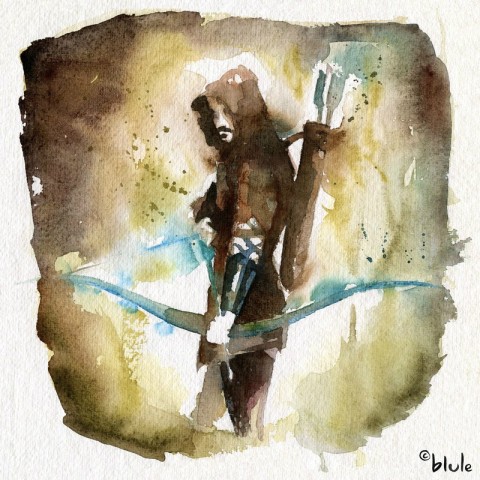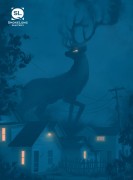In the boy’s mind, his father could be anyone: A taxi driver or a chef, an actor or a judge. Someone who lives in one of those tall, shiny office towers in Albuquerque. Maybe his father wears those skin-tight suits and steps onto the backs of whales to cheering crowds. But his mother has said his father is none of those; that his father is far away, hiding. So the boy wonders if his father is an outlaw. (The obvious thing that comes to his mind is Robin Hood, who’s in all of his library books and who’s an outlaw, but also good.) Maybe his father hides because the sheriff is after him. Yes, his mother says, that is closer to it. And for years the boy thinks of his father this way: Whistling to his men in a forest somewhere, darting between trees, all the swashbuckling and sword-fighting glory of those stories.
But there are no green forests in southern New Mexico, no trees to swing from. There are no bands of men, except, well, the ones that sneak in through Ciudad Juarez. Maybe his father is one of those caught in the night, sent back. Maybe he spent nights alone in a cell somewhere, then driven out back across a border, ditched in some squalid town, Ascensión or somewhere near. Maybe his father has been trying to come back for years. Maybe he disguises as a musician, a scientist, a tourist and tries again and again. The boy is good at science and music (he has taught himself to play violin on a broken one he found on the curb) but he prefers reading stories. His father must know lots of stories, funny ones too. The boy likes those best. Maybe his father tells jokes to the men at the border, makes them laugh. Magic tricks too. He knows how to make a flower bloom from a rock, a stone bird fly away; knows what card the border officer is holding behind his clipboard. A magician, that’s his father’s best costume. He’s an expert at making money appear too—hundred dollar bills, he can pull them out of his sleeve! The boy’s mother laughs; it isn’t a real laugh, but an exhausted exhale of air. She’s chopping onions fast and nervous, listening to the boy. Not so far from truth, his mother says, and shakes her head.
So his father, the magician, can make money appear. He’s rich, maybe has a whole house filled with indoor orange trees. He’s waiting until the boy is old enough, ready to visit him in his mansion in Ascensión. There are lagoons surrounding the house, with water snakes that swim on the surface in patterns like looping rope. When the boy lies in bed, sometimes hungry, he thinks of his father’s house where there are rooms filled only with music, with guitars and pianos and flutes and drums and unbroken violins.
The boy draws his father’s house in all of his notebooks, in pen, pencil, crayons he steals from school. When he shows his mother and says, “This is where my father lives,” she laughs.
No, his mother says. You’re full of dreams. Let me tell you of your father. She pulls out a newspaper from ten years ago, buried, hidden. On the front is a man with a leering face, dark flat eyes, a mouth held half open. You see all this your father has done? Look here. Read! She shakes the paper in his face.
But the boy is not looking. He does not remember his father, does not remember the man with dark flat eyes, does not remember any father or any man who was ever like a father, and he has come to love this as a kind of freedom he has been gifted. Out of all the boys in the world, he alone can choose his own father. And as his mother begins to read, her voice shaking, he listens for the music, soft, sweet; the violins are laughing somewhere, and the boy is riding them, like flying serpents through the night.


